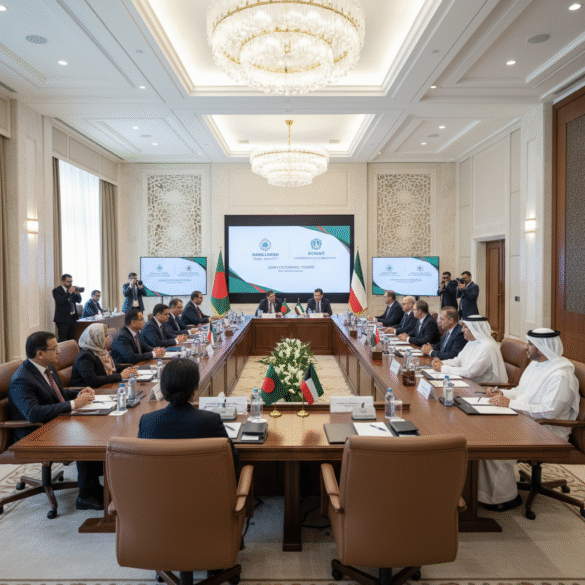A Bangladeshi trade delegation met with the Kuwait Chamber of Commerce and Industry to discuss ways to boost trade and investment between the two countries, opening a fresh chance for businesses on both sides. The delegation, led by a senior export department official and joined by the Bangladesh ambassador, presented a clear overview of investment incentives and priority sectors where Kuwaiti partners can engage. They highlighted strong offers in ready-made garments and knitwear, pharmaceuticals, food processing, agriculture, renewable energy, healthcare services and halal food production, explaining how special economic zones and tax incentives can make projects attractive. Representatives said Bangladesh can provide reliable supplies, skilled workers, and competitive manufacturing while Kuwait can help with investment, market access and food security initiatives. KCCI members and Kuwaiti business leaders responded with interest, asking about logistics, quality standards, testing facilities and ways to fast-track trade ties, and delegates promised follow-up work to ease customs, shipments and regulatory steps. Delegates also discussed training and employment opportunities for skilled workers from Bangladesh in health, technical and professional roles, and they explored how joint ventures could add value through local processing and technology transfers. The meeting included suggestions for trade roadshows, buyer-seller meetings, and joint feasibility studies so early projects can move from talk to contracts with clear timelines. Both sides agreed to set up working groups to map concrete projects, share data on demand and supply, and link private companies with government incentives and bank financing where needed. Officials said food security, halal certification and agro-processing are immediate areas where small and medium firms can win new orders, while longer term plans could focus on renewable energy, healthcare goods and mineral exports. For small exporters, the talks promise simpler access to a new market and a chance to scale up production, while investors may find stable returns through special zones and public-private partnerships. Participants stressed practical next steps like pilot shipments, plant visits, simplified visa arrangements for business travelers and clear points of contact so deals do not stall. The outcome is a positive push toward stronger ties that aim to create jobs, increase exports, bring investment and make trade easier for firms on both sides. Business groups were asked to stay engaged and prepare bankable projects, and officials said they will follow up quickly to turn interest into real trade and investment that benefits communities in both countries. They also talked about improving digital payment links, setting up faster cargo channels and sharing quality control labs so trade is smoother. If plans move ahead, more small factories and farms may win steady contracts, towns can gain new jobs, and families may see higher incomes from growing exports. Work is planned to begin very soon.
Bangladesh and Kuwait Forge New Trade Ties at KCCI to Boost Exports and Investment
40


